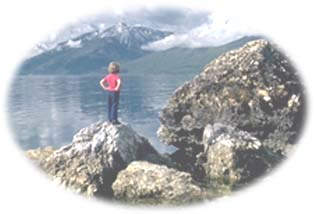|
It is a well known scientific truth that islands have higher species extinction rates than continents, and that the smaller an island is, the faster extinction occurs. Similarly, parks are at risk of becoming 'islands' within landscapes of development. The new science of conservation biology,which focuses on species and ecosystems survival, reveals that even parks as large as Spatsizi risk becoming 'islands' unless buffers and connecting corridors to other large wildlife preserves are provided. Particularly as climatic change threatens our planet, if extinction, especially of large mammals, is to be prevented, wildlife must have routes available to move north and south with the anticipated changes in vegetation.
|
|
As well, if natural populations are to avoid the weakening that can occur as a result of genetic inbreeding, animals need to be able to roam not just within large sanctuaries but between them. And while conservation biology doesn't call for outright protection of these buffers and connectors, the need is for careful lower-intensity resource use if viable wildlife populations in the great reserves, like Tweedsmuir, are to survive.
In the two decades since Spatsizi's protection, human exploitation of the Earth has accelerated so much that we are now facing a global extinction rate of at least 100 species per day. In effect, we are condemning to oblivion life-forms  that have been evolving for four billion years. Not only is such destruction Homo sapiens' ultimate selfishness, it is also suicidal. Recently scientists have recognized that failure to stop the loss of biodiversity may lead to the collapse of the entire web of life as we know it. If this calamity happens, scientists say the endangered species will likely be us. Recognizing that our survival is also on the line, we begin to see that the large sanctuaries, once set aside for wildlife, are much more crucial now. In essence, they are biological lifeboats. that have been evolving for four billion years. Not only is such destruction Homo sapiens' ultimate selfishness, it is also suicidal. Recently scientists have recognized that failure to stop the loss of biodiversity may lead to the collapse of the entire web of life as we know it. If this calamity happens, scientists say the endangered species will likely be us. Recognizing that our survival is also on the line, we begin to see that the large sanctuaries, once set aside for wildlife, are much more crucial now. In essence, they are biological lifeboats.
BC's parks serve as modern-day Arks to ensure that wild creatures, both predator and prey, will never vanish. And just as Noah saved all in his keeping and gave the planet a future, so too must we cherish these wilderness places. The living heritage of these parks belongs to the whole world for all time to come.
|

